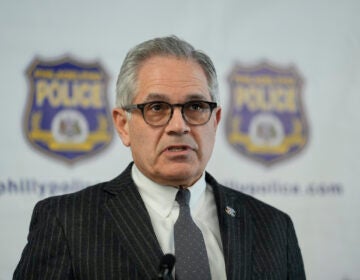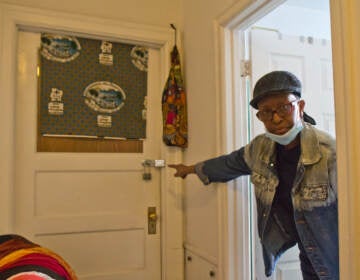Does Father St. George have a legal case against Chestnut Hill College?
Chestnut Hill College’s recent decision to sever ties with a gay instructor has raised questions about whether the circumstances of the move were legal.
Father Jim St. George, 45, was a part-time teacher at the college who worked on a contract-basis. He maintains that he was fired for having a long-term relationship with a man. A fact the Catholic institution reportedly learned from reading St. George’s blog.
His dismissal notice, dated Feb. 18, was written one-day after a letter was sent by a Blue Bell-based attorney, who complained the college shouldn’t have St. George teaching. Both letters came after The Philadelphia Daily News featured a column about an ad campaign by St. George’s church to attract new members. The column did not mention St. George’s sexual orientation.
The same letter, penned by James Pepper, was also sent to the Archdiocese of Philadelphia and the Philadelphia Daily News. Pepper said he also learned of the gay relationship from St. George’s blog.
Father St. George’s key claim
St. George said he suspects the college was aware he was gay before it even invited him to teach there. He told NewsWorks that the college never indicated, either verbally or contractually, that he was required to follow the college’s reining religious doctrine, Roman Catholicism.
Traditionally, the Roman Catholic Church accepts gay and lesbian priests as long as they remain celibate. It is considered a sin once they become sexually active. St. George is a pastor at St. Miriam, a parish of the Old Catholic Apostolic Church of the Americas, which permits priests that are gay, straight, male, female, married and celibate.
Did the college really fire St. George?
Most media reports have similarly characterized CHC’s decision as a firing. College officials, however, take issue with that label and instead say St. George wasn’t offered a new teaching contract.
Kathleen Spigelmyer, director of communications for CHC, said all that happened was St. George was not offered a new contract.
“I’m not trying to split hairs here with terminology,” Spigelmyer told NewsWorks. “With adjuncts, that’s how it works. It’s not an ongoing process. (…) You have a start date. You have an end date and your employment ends at the end of that semester or that session.”
St. George confirmed that neither he, nor the college ever signed a contract before the start of the spring session, which began Feb. 28. But he said he had every indication that Chestnut Hill College wanted him to teach.
All signs were go!
St. George, who has taught religion in the School of Continuing and Professional Studies since January 2010, said the college asked him to teach two courses almost two months ago and that he had submitted both syllabi for approval.
“Every semester works the same way,” says St. George. “They tell me what classes I’m going to teach, they send me an email telling me the contracts are in my box and then next time you’re on campus, you sign them and that’s the end of it.”
“You sign them and then it can take up to a week or so after you teach before you even see them,” he said.
St. George did receive an email informing him and other teachers that contracts for the current session were ready for pick-up, according to a Feb. 16 email obtained by NewsWorks.
Spigelmyer confirmed that St. George had submitted two syllabi for Theology and Justice and World Religions and acknowledged that students had likely signed up for those courses. She could not confirm if those syllabi had been approved, but reiterated that a teaching position at the college is not official unless a contract is signed by both parties.
“And that never happened,” says Spigelmyer.
No contract and then the bad news
On Feb. 24, four days before classes were scheduled to begin, St. George received a letter in the mail from the college informing him that his services were “no longer be needed.” The letter was dated Feb. 18, again just one day after CHC received Pepper’s letter calling St. George a “heretic” and his teaching position at the college “scandalous”. The college maintains it made its decision independently of Pepper’s letter.
When asked if the college’s letter reflected that he was fired or not given a new contract, St. George said, “that’s a matter of semantics. I’m out of a job.”
How a legal case might move forward
Determining whether St. George could win a discrimination case is difficult. Any potential lawsuit would involve proving the college knew he was gay all along and is now only using it as a reason to part ways.
Sidney Gold, a Philadelphia-based employment attorney not representing St. George, said there are many things to consider in this case.
In particular, Gold said the simple fact that the college did not offer a new contract is not enough to completely exonerate them from any wrongdoing. An at-will employee, like an adjunct professor, can be fired any time for almost any reason. The exception, he says, is when discrimination has taken place.
“If you have a contract that expires, you’re still protected under Title VII [of the Civil Rights Act of 1964] and under the Philadelphia ordinance that protects individuals from being discriminated against based on sexual orientation,” said Gold.
Title VII, the federal law, however, does not protect against discrimination based on sexual orientation.
Religious institutions are different under the law
Still proving that the college specifically practiced discrimination in this situation won’t be easy, Gold added. In any traditional workplace, the college’s decision against St. George would likely lay concrete groundwork for a fairly straightforward lawsuit. Religious institutions, however, are held to a different standard if a decision about an employee is made in the name of religious doctrine.
In a statement prepared by the college and sent to students Feb. 27, CHC explains it chose not to offer St. George another teaching contract because his personal life is “at odds with the beliefs and mission of Chestnut Hill College and the Catholic Church.”
“The Supreme Court looks at this as though they are, in essence, protecting the Church’s First Amendment rights for freedom of religion, freedom of expressive association,” said Gold.
“It’s almost like you’re relinquishing your rights because you went to work for a religious institution,” he said.
Did the college know he was gay?
But those rights can be restored if St. George can prove CHC knew about his sexual orientation when they hired him or at any time before they told him he wouldn’t be returning to campus.
“If in fact they did know and they were willing to waive that issue back when he was hired or when they became aware of it, you could claim they they’re using this as a pretext for discrimination, that this is not a bona-fide religious decision,” said Gold.
The college’s statement from Feb. 25 alludes to the fact they did not know St. George was openly gay. “At the time St. George joined our faculty he presented himself as Father St. George and openly wore a traditional Catholic priest’s collar,” reads the statement.
St. George hires an attorney
At the moment, St. George is not preparing to take any legal action against the college, though he says he has hired George Bochetto, a Philadelphia-based attorney, who has advised him of his options.
“I don’t have any definitive action plans yet because it’s just so overwhelming to me still,” said St. George.
Courting public opinion
As St. George sorts out the situation, a number of students on campus have begun rallying for his reinstatement.
Jessica Murray, 23, a senior, had St. George in the summer of 2010 for a class, Religion and Culture.
Murray has been spearheading the reinstatement campaign since she learned her beloved professor wasn’t returning to the Northwest Philadelphia college. She said the college unfairly targeted St. George and is sending the wrong message to the CHC community.
“If he was fired because he wasn’t following the rules of Roman Catholicism, than any teacher that is divorced, has a child out of wedlock, you can go on, then they should be fired as well,” says Murray.
“You’re supposed to be teaching future teachers and future bosses and future parents on how to act towards people and this is your model?” she exclaimed.
Murray said her father was raised Catholic, but that she wasn’t. She says she chose Chestnut Hill College because she wanted to learn more about the religion. In particular, Murray was searching for a way to see the Church in a positive light.
St. George, she said, helped her capture her first glimpse of that goal.
“I finally found a person, a Catholic priest, that I enjoyed learning from and that I did not feel was a religious hypocrite and they took that away from me,” she said.
“No one is happy about this,” Murray said.
Student petition drive begins
Last week, Murray began circulating a petition around school in support of St. George. She said she wants to show every dean of the program that students support him. Finally, Murray said, she plans to send a copy of the petitions to the Archdiocese of Philadelphia.
The top of the petition reads: “Please sign the petition to reinstate Father James Saint George at Chestnut Hill College, after he was wrongfully dismissed. He has a 99.8% – 100% approval rate among his students. Show your support for equality, religious understanding and justice. Stand up for your right to choose the teachers you wants in the classroom.”
Murray has also has started a Facebook page called “Support Father St. George”. It currently has more than 130 followers.
A rally was planned for Saturday, but was postponed so more students could organize on campus, according to a post on the page from March 3.
Murray and others, however, are not very optimistic the college will extend an offer to St. George. A reinstatement, she said, would be akin to CHC admitting they made a poor choice.
St. George isn’t holding out much hope either.
Does St. George really want to return?
While he does have an interest in returning to the college, he said he would only do so after a meeting with members of the college’s administration and the Archdiocese to discuss the situation and how to prevent it in the future, something that hasn’t happened to date.
“What a wonderful statement it would be. Could you imagine them holding a press conference saying that we all sat down and we worked this out and we’re all OK. I think it would certainly tell the world what a Christian is all about.”
The college is ready to move on without St. George
In a second statement released March 3, CHC says that it hopes to move past this situation and ensure it “never happens again”.
” It is our deepest hope that, ultimately, this divisive, painful experience will unify the Chestnut Hill College Community, and all those close to us, in a new and stronger bond so that we may strengthen our commitment to diversity and demonstrate our determination to work for justice, equality, and peace for each and every person,” reads the statement.
There is no mention of mending fences with St. George.
WHYY is your source for fact-based, in-depth journalism and information. As a nonprofit organization, we rely on financial support from readers like you. Please give today.




